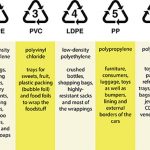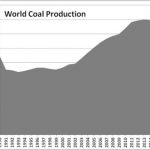Plastic Recyclers Chasing Arrows
According to Plastics Europe Research Group, over 35 million tons of plastic material was produced globally in 2016, the last year for which full-year data is available. That brought total plastic production to 9 billion tons since 1950. All of those plastic materials remain in existence somewhere - still in use, landfills, junk yards, blowing around the countryside, waterways, oceans, fish stomachs. The post “Plastic Contagion’ on April 13th outline the dangers presented by plastic waste, ranging from respiratory failure from toxic emissions to reproductive interference in aquatic animals.
The building burgeoning volume of plastic waste has sent environmentalists scrambling for solutions to the plastic waste...
Environmental Markets: The Next Frontier in Environmental Investing?
The term environmental markets remains foreign to most investors (and environmentalists!), even though these markets represent, in my view, a very compelling investment story. Although we've discussed trading in carbon emissions in the past, I thought I would expand a bit and talk about environmental markets in general, and about good ways to play them. What's An Environmental Market? Environmental markets exist at the confluence of two movements: (a) A growing desire on the part of national and regional governments in several countries to both limit environmentally-damaging behavior and to promote the growth of alternative...
How Energy Deregulation Affects States and Stocks
by Elaine Thompson
Bloomberg New Energy Finance, in an executive summary of its New Energy Outlook 2017 report, predicts renewable energy sources will represent almost three-quarters of the $10.2 trillion the world will invest in new power-generating technology.
Analysts outline several reasons for this increase in spending, such as the decreasing costs of wind and solar and consumers’ increasing interest in solar panels. Competition between power sources also continues to grow, with products like utility-scale batteries upsetting coal and natural gas’s roles in the marketplace.
But more importantly, state-driven renewable portfolio standards pave the way for additional ventures in renewable energy technologies, particularly...
Biochar’s Likely Market Impacts
Biochar is still mostly a research and cottage industry, yet it has the potential to impact returns for a broad range of investors. Tom Konrad, Ph.D., CFA Biochar, or amending soil with biomass-derived carbon, shows great potential to improve the productivity of soils, as well as to increase the utilization of fertilizers by plants, while sequestering carbon to reduce the drivers of climate change. On August 10, I went to the 2009 North American Biochar Conference to look at the potential for investors. Before I went, I took a look at the publicly traded companies...
List of Environmental Markets Stocks
This post was last updated on 4/27/2022.
Environmental market stocks are publicly traded companies whose business involves the trading of commodities designed to represent an environmental attribute, such as renewable electricity, the environmental benefits of renewable energy (Renewable Energy Credits ), Carbon Offsets and other types of environmental offsets.
Carbon emission trading implemented
Carbon emission trading scheduled
Carbon tax implemented
Carbon tax scheduled
Carbon emission trading or carbon tax under consideration
By Tbap , via Wikimedia Commons
Crius Energy Trust (KWH-UN.TO, CRIUF)
GlyEco, Inc. (GLYE)
Hannon Armstrong Sustainable Infrastructure (HASI)
Just Energy Group Inc. (JE)
KraneShares Global Carbon ETF (KRBN)
Trading Emissions PLC (TRE.L)
If you know of...
Climate Change & Corporate Disclosure: Should Investors Care?
Charles Morand On Monday morning, I received an e-copy of a new research note by BofA Merrill Lynch arguing that disclosure by publicly-listed companies on the issue of climate change was becoming increasingly "important". The note claimed: "e believe smart investors and companies will recognize the edge they can gain by understanding low carbon trends." I couldn't agree more with that statement. It was no coincidence that on that same day the Carbon Disclosure Project (CDP), a non-profit UK-based organization that surveys public companies each year on the state of their climate change awareness, was...
Is Energy Sourcing the Gateway Drug to Energy Efficiency?
Tom Konrad CFA I recently interviewed Richard Domaleski, CEO of World Energy Solutions (NASD:XWES). World Energy is a comprehensive energy management services firm whose core offering is extremely price competitive energy sourcing (that is, finding an energy provider to supply all of a client's energy needs at the lowest possible cost.) They achieve competitive sourcing using an electronic energy exchange designed to achieve much better price discovery in what is traditionally a very opaque market. According to Domaleski, a recent KEMA study showed that only 7% of large commercial, industrial, and government customers are sourcing their...
Avoiding a Carbon-Price Backlash
by Tom Konrad, Ph.D. Economics and Greenery, a Belated Rapprochement It is truly a triumph of economic ways of thinking that many of environmental activists are championing market-based approaches to tackling climate change. Those people who are not for cap-and-trade on global warming gas emissions promote the even more economically rigorous carbon tax. The most common defense against criticisms of subsidies for renewable energy is to retort that the fossil fuel industry benefits from much large subsidies. Not only do fossil fuels get generous subsidies in direct and indirect payments, but they seldom pay anything like the indirect costs...
GlyEco Expands Antifreeze Recycling Footprint
by Debra Fiakas CFA Glyeco recycles waste glycol into reusable antifreeze, windshield wiper fluid and air conditioning coolants for the automotive and industrial markets. The used coolant and antifreeze liquids are frequently contaminated with water, dirt, metals and oils. The company uses a proprietary technology at the foundation of its recycling system to eliminate contaminants. The company focuses mainly on ethylene glycol in its six processing plants. Last month chemical recycler GlyEco, Inc. (GLYE: OTC/QB) acquired Brian’s On-Site Recycling, a provider of antifreeze and air conditioning coolant disposal services in the Tampa, Florida area. The deal extends...
Trading Places: Will America’s Carbon Market Outsize Europe’s?
Charles MorandIn early January, I said the following on the likelihood that the Obama Administration would move on carbon regulations in the near-term: "The next 12 to 18 months are unlikely to produce much in the way of vigorous environmental action on the part of government (barring subsidies for alternative energy related to the stimulus package), especially if it means additional costs on industry." Clearly, I had underestimated the power of another fundamental rule of politics - besides "don't anger the rust belt states that gave you your presidency by burdening their industries with avoidable costs in the midst...
Emissions Standards Driving Algae Aviation Fuel Sourcing…or not
by Debra Fiakas CFA Algae in the River Wate photo via BigStock My post “Algae Takes Flight” featured Algae-Tec (ALGXY: OTC/PK), Lufthansa’s new biofuel partner. Algae-Tec has agreed to operate an algae-based biofuel plant in Europe to supply Lufthansa with jet fuel. Lufthansa is footing the capital costs of the plant, which is to be located in Europe near a carbon source. Algae thrive on carbon so industrial plants and power plants using fossil fuels make the best neighbors. Lufthansa has agreed to purchase a...
US Presidential Election & Carbon Markets: Is The Climate Exchange Story Overdone?
An interesting piece yesterday in POLITICO on how carbon prices on the Chicago Climate Exchange (CCX) have been trending up in recent months, mostly since it's become clear that all three remaining presidential hopefuls will likely regulate CO2 emissions at the federal level. In fact, as per the chart above, prices for the right to emit a metric ton of CO2 have been on a tear, recovering from a pretty significant slump in the preceding months. Last week, the World Bank Carbon Finance Unit released its annual update on the state of global carbon market (PDF...
Fossil Fuel Industry: Killing the Customer
by Debra Fiakas, CFA
Published by the Climate Accountability Institute, the Carbon Majors Reportlays bare the truth about which companies are responsible for industrial greenhouse gas emissions. One hundred fossil fuel producers are linked to 71% of global industrial greenhouse gases emitted since 1988. Something like a line in the sand for climate scientists, 1988 is the year human-induced climate change was official recognized by the Intergovernmental Panel on Climate Change.
Fossil fuels in the form of coal, crude oil and gas are by far and large the culprits. Rolling forward three decades later, we can observe in the charts below that fossil fuel production...
Carbon ETFs/ETNs: Playing Copenhagen
Charles Morand At $126 billion transacted in 2008, up from $11 billion in 2005, the global carbon market is the fastest growing commodities market in the world and, provided that an agreement is reached at the COP15 conference in Copenhagen and that the US adopts a cap-and-trade program, this growth could go on for several more years. Yet this is a market that remains comparatively unknown for a number of reasons, not the least of which is the fact that the rules surrounding it are very complex. Unlike other commodities, to successfully invest directly in...
The Republican-Proposed Carbon Tax
by Noah Kaufman A group of prominent conservative Republicansincluding former Secretary of State James Baker III, former Treasury Secretary Hank Paulson, former Secretary of State George Shultz and former Walmart Chairman Rob Waltonmet with key members of the Trump administration on Wednesday about their proposal to tax carbon dioxide emissions and return the proceeds to the American people. Such an economy-wide tax on carbon dioxide could enable the United States to achieve its international emissions targets with better economic outcomes than under a purely regulatory approach. Attributes of the Republican Carbon Tax Proposal While the details on the...
Carbon Finance…The Next Bonanza
Few investors outside of Europe have ever heard of the term carbon finance. What some investors might have heard, however, is that Goldman Sachs took, on September 20, 2006, a 10.1% stake in a little outfit known as Climate Exchange plc (LSE:CLE) for approximately $23 million. Admittedly, by Goldman Sachs standards, that’s peanuts. Not to be outdone, Morgan Stanley unveiled a plan on Thursday October 26 to invest a whopping $3 billion in global carbon markets over the next few years…now that’s the kind of money that gets folks talking at the water cooler, especially when it’s in something...





